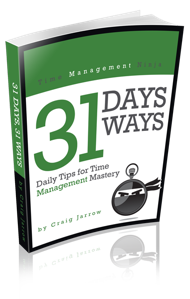
Do you waste time looking for things you lost?
Misplaced items are one of the top productivity busters.
Today, I have 10 tips to help you stop wasting time looking for your stuff.
So, what are you wasting time looking for?
What Are You Looking For?
Whether it is a lost shoe before work or that missing paperwork that you end up spending half your day looking for, lost items are a big time waster.
If you are wasting time looking for things you misplaced, then you aren’t getting your priorities done.
Of course, the key is not to misplace them in the first place.
“If you don’t put things away now, you waste time searching for them later.” (Tweet this Quote)
If you are wasting inordinate amounts of time looking for your stuff, then it’s time to look at some tactics to prevent the situation in the first place.
Here are 10 Steps to Stop Wasting Time Looking for Lost Items:
- Put It Away the First Time – Before you set that item down, ask yourself the simple question, “Where should it go?” Putting one item away may not seem like much. But, if you don’t, compound that over a week and your entire home or office will be cluttered.
- Take 10 Steps to Put It Away – Chances are when you set something down, you are probably 10 steps or less from where it should go. Take those 10 steps to the drawer where it belongs. Or 10 steps to the garage to put that tool back in the tool chest. 10 Steps now might save you hundreds later when you have to clean the entire house.
- Have a Home Base for Things – It’s hard to put things away, if you don’t have a place for them. Give everything a “home base” where it belongs. Create common “home bases” for similar items. It makes things much simpler when putting things away and much easier when you go to look for them again.
- Create Clean Zones – If you have particular trouble spots for clutter then try creating “clean zones.” Designate a specific area as a no clutter area. If that countertop in the front hallway is always piling up, then clear it off and make it a “clean zone.” This means that nothing gets put there. Is that side desk at work covered in stuff? Make it a clean zone, as well. By taking this approach, you’ll have fewer places to pile things and will be forced to take action.
- Spend 15 Minutes a Day Cleaning Up – One of the secrets to keeping the clutter in check is to clean for a few minutes each day. If you spend 15 minutes a day cleaning up, you’ll prevent those big cleanup jobs that take all weekend. After all, it’s easier to eat that elephant one bite at a time, instead of all at once.
- Piles Are Not Productivity – Get away from piling. It is not a great organization strategy. You may say, “I know exactly where everything is.” But, what you are really saying is, “I don’t have the discipline to put things away.” (Here are my additional thoughts on piling.)
- No Dishes in the Sink Rule – Make “Clean Rules” to enforce what is acceptable and unacceptable behavior. Whether it is “no dishes in the sink” or “no storage in the hallway,” set rules that make sense for your space.
- Move the Trash Can Closer – If you have to get up, reach, or throw things to the trash can, then it is too far away. How often do you set things on your desk simply because you cannot easily put them in the trash from where you are sitting? Move that trash can closer.
- Go Virtual with Your Paper – Paper is one of the top clutter items in both the office and home. Yet, 99% of the papers you keep you will never need or look at again. But, how do you quickly find the 1% that you will need? The best way is to go paperless. Scan your papers and then back them up. If you must store paper, have a system (other than piling) to store them in an organized manner.
- Keep Your Workspace Clean – One of the most important spaces you can keep clean is your work area. If your desk is a mess, then your clutter is going to impact your ability to get work done. Designate your immediate workspace a “Clean Zone.” (See #4)
Put It Away the First Time
Don’t waste your time looking for lost items or cleaning up unnecessary clutter.
Put things away the first time, so that you don’t have to later clean up bigger messes. Avoid the piles and put things where you’ll know to find them later.
The next time you go searching for something… it will be right where you put it.
Question: What items do you waste time searching for? You can leave a comment by clicking here. I am the author of Time Management Ninja and help individuals and companies reclaim their time to be more productive. As well, I am the author of the book
I am the author of Time Management Ninja and help individuals and companies reclaim their time to be more productive. As well, I am the author of the book 

Adding to #9: For me, the biggest benefit of going paperless, other than (as you say) just having all that clutter out of the way, is that you can word-search for anything you need. Our office has been looking at going paperless for a while, and I’m really excited. I don’t like going through filing systems (physical or virtual) when I need to find something. So this is a HUGE win for looking for lost items.
As far as physical things go, I almost always know where to find something, even if I don’t put it away immediately. That’s because I have sorted dump areas (one could call them “inboxes”, though not in the classic GTD sense) that I go through once a week for different things, like receipts or mail (this may be roughly what you’re describing in #2). Instead of “putting it away the first time” (#1), I just toss an item into the appropriate dump, maybe a shelf or a folder, knowing that I’ll get to it eventually (e.g. I go through my receipts folder on Wednesdays). This especially works when I don’t have time to sort and file the item and the alternative is just to leave it on my desk, which I never like to do. I have a “the room looks nice and the desk is clear” policy (#7 and #10). So even if I don’t have time to put something away, I can at least put it “away”, or on a dump shelf where I know I’ll go through it soon.
If I remove a tool for the tool box that is in the pantry, I leave the light on and the door open until I return it. If I come back to the kitchen without it, it reminds me to go get it and return it to its place.
When I finally find the thing I’m looking for, when I’m done with it, I put it back IN THE FIRST PLACE I LOOKED! That’s almost always the place where it belongs, the place where it should be, and the place where I’ll look for it (or any related item) the NEXT time I go looking for it.
The hardest thing I find about putting things away the first time is getting into the habit!
Going paperless is a very good idea which I have been doing now for about 9 months. It has made my table look a lot tidier and easier to find things. I now need to sort out all the files on my computer now as I seem to virtually misplace paperwork now!
I think time management is one of the most underrated topics. I believe that we would all be better individuals if we manage out time efficiently. For time management, Personally i use Replicon software, it is a great tool to save time and cost as we can do things almost simultaneously and can track our performance using it.
I use this ( http://www.replicon.com/olp/online-time-recording-software.aspx ) software for time tracking and invoice generation. Invoice making with this application is so easy and we can also manage our expenses with it efficiently.
Number eight is anti-productive as the cat will push things off my desk and make me lose them in the trash.
Great article. I once read that an average person uses a year in total during a lifetime to find things that have been forgotten or gone away